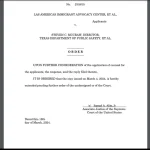- Joined
- Mar 3, 2019
- Messages
- 8,408
- Reaction score
- 5,666
- Location
- SoCal
- Gender
- Male
- Political Leaning
- Libertarian
Texas Law SB-4 makes it a state crime to cross the Texas-Mexico border between ports of entry. If a police officer has probable cause to believe a person illegally crossed the Rio Grande, that person could be charged with a Class B misdemeanor.
Texas SB-4 allows police to question and arrest anyone they believe entered Texas through Mexico illegally and is currently without legal immigration status. Last December, Governor Abbott signed SB 4 into law, which was supposed to take effect March 5th, however, the U.S. Supreme Court blocked SB-4 arguing that illegal crossings are the jurisdiction of Federal agents. The S.C. block expired yesterday, so as of today, SB-4 is in effect.
Most Texan voters are concerned that the sheer volume of illegals coming into the U.S. via the Texas border are too much for Federal border control agents, and this is why SB-4 was passed.
source: https://www.texastribune.org/2024/03/18/texas-sb-4-immigration-arrest-law/
IMO SB-4 should stand because the Federal agents don't have the resources in order to control the unprecedented volume of illegal crossings into the state. A reasonable compromise would be to include a 'sunset' provision into the Law - meaning that at some date it would expire (typically after 2 years), and it would then go back on the ballot.
(this thread is not in the Immigration sub-forum because it is not an immigration issue. The topic is about separation of powers )
Texas SB-4 allows police to question and arrest anyone they believe entered Texas through Mexico illegally and is currently without legal immigration status. Last December, Governor Abbott signed SB 4 into law, which was supposed to take effect March 5th, however, the U.S. Supreme Court blocked SB-4 arguing that illegal crossings are the jurisdiction of Federal agents. The S.C. block expired yesterday, so as of today, SB-4 is in effect.
Most Texan voters are concerned that the sheer volume of illegals coming into the U.S. via the Texas border are too much for Federal border control agents, and this is why SB-4 was passed.
source: https://www.texastribune.org/2024/03/18/texas-sb-4-immigration-arrest-law/
IMO SB-4 should stand because the Federal agents don't have the resources in order to control the unprecedented volume of illegal crossings into the state. A reasonable compromise would be to include a 'sunset' provision into the Law - meaning that at some date it would expire (typically after 2 years), and it would then go back on the ballot.
(this thread is not in the Immigration sub-forum because it is not an immigration issue. The topic is about separation of powers )


